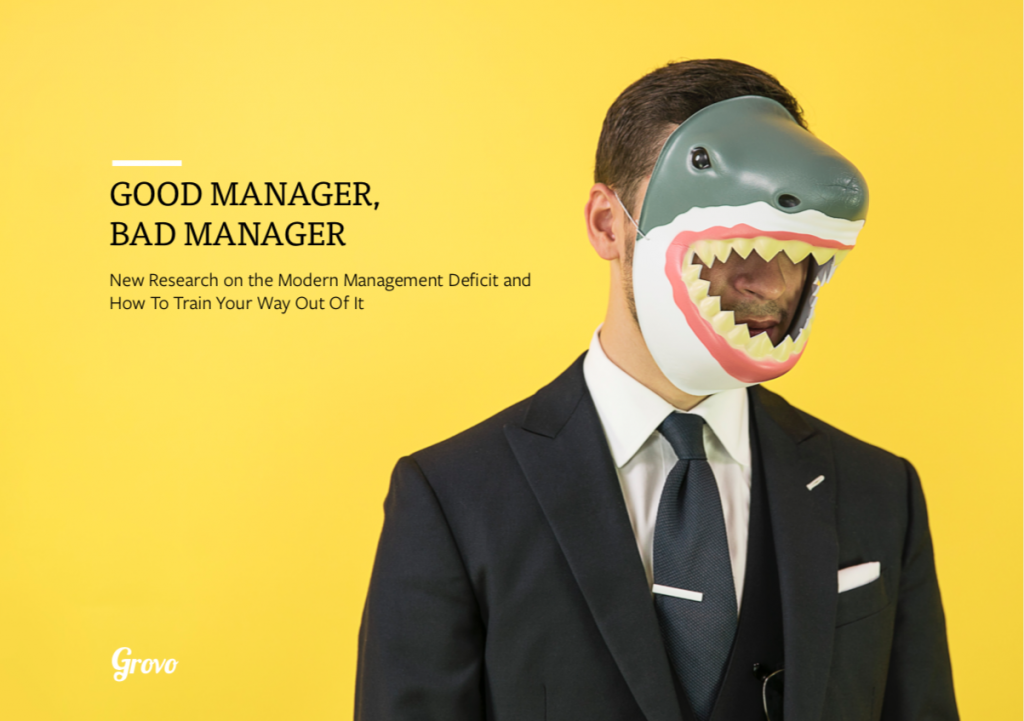As someone who’s passionate about management development, I’m always on the lookout for research on development methods and, more importantly, ways to improve the quality of managers.
A couple of months ago I came across a report written by training provider Grovo called GOOD MANAGER, BAD MANAGER – New research on the modern management deficit and how to train your way out of it. The report begins with some startling statistics on the effectiveness of managers and, not surprisingly, the vital role managers play in organisational effectiveness.
Conducted in partnership with Wakefield Research, Grovo sought to address three questions:
- How do most organisations currently train managers?
- What’s working and not working about these methods?
- If there were a better way to train managers today, what would it look like?
The report uses shark and zebra imagery throughout, characterising bad managers as being like great white sharks, spelling imminent danger, leading to sunk costs and talent casualties. Good managers are seen as being like zebras, symbolising balance, agility, clarity and sureness of path.
Below I’ve summarised the standout themes from the research.
How people become managers – or as the report calls it why good people become bad managers.
The top performer being promoted to manager is a tale almost as old as time and a topic worthy of a separate discussion. The research identifies issues with how these new managers are developed.
- Citing that middle managers believe 2 out of 5 of their company’s managers and unprepared for the role, the research identifies that the development process isn’t adequately supportive – unarmed and in charge.
- Poor management often goes unnoticed and you can see how. A new manager takes over an existing team of competent staff then the team will probably continue to perform. This identifies two issues:
- the need to focus on intangible skills, such as listening and empathy
- the need to evaluate manager ability – 76% said ineffective managers are frequently rewarded or promoted.
Problems with how management development is delivered
The research identifies that 99% of companies do offer some form of management training, which is great to hear. This does however often fall short:
98% not comprehensive – most management training doesn’t dig deep enough into the myriad skills and behaviours required to do the job well. Areas lacking include conflict resolution, employee turnover and time management.
87% not timely – for those new to the role there’s a window of opportunity when motivation to learn is at its peak. Some companies wait months before delivering any kind of formal training, missing the window
72% not habitual – being a good manager requires constant learning and practice to master. Training is often infrequent.
In addition to these areas, the research identifies a deeper issue – the training content itself.
80% of managers who change their behaviour after management training go back to their old ways in just 6 months or less. The research identifies the main reasons why:
The training is too long – the volume of information makes it difficult to remember and apply – you can’t learning everything at once
It’s not engaging – if they’re not feeling it, it’s not working
There’s no follow up – reinforcement is a requirement.
A new philosophy
Grovo puts forward a new approach, based on behaviours and what you want managers to actually do. There is the need to stop thinking about management training as a way to increase what managers know, and instead transform what they do. Their approach focuses on three core themes:
- Not a skill, but a system
- Not excellence, but competence
- Not a pit stop, but a journey.
Having identified the core behaviours, the new philosophy outlines ten items to get right in a management development programme:
- Treat your programme like a campaign, not a course
- Launch with a bang
- Build in behavioural objectives
- Provide holistic support
- Make it digestible with microlearning
- Start each lesson with inspiration
- Support habit formation
- Guide practice over time
- Make it look good
- Deliver a seamless experience.
Although it’s clear Grovo has produced this report as a way of marketing their management development training, much of the content rings true with what I’ve experienced from working in, and with, organisations on this topic. There are a couple of standout points that chime with me:
Firstly, it’s clear there’s a need to develop the right people, with the right content at the right time. I’ve often seen organisations investing sometimes quite substantial sums on the development of their senior leadership team. I’m not saying that this shouldn’t happen but it needs to be matched with the development of all management capability. The point the research says about focusing on competence is also vital as there’s no point even thinking about excellence without first getting the basics right.
The matter of how managers are developed is the second point I’d pick out. The rolling out of programmes in what I call a sheep dip approach is acceptable in terms of ensuring everyone receives a consistent message. The research does however highlight the need for development to be seen as a journey rather than a pit stop, and that journey may diverge and converge based on the development needs of the individual managers.
Resources
Click on the image below to access Grovo’s report.




